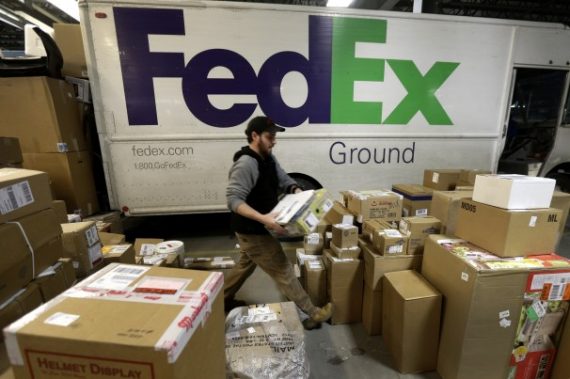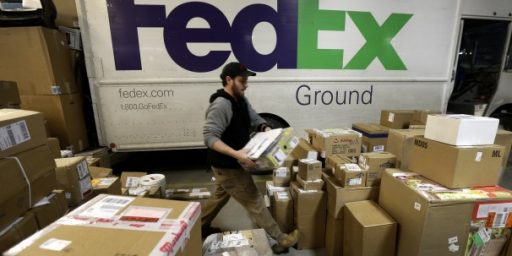Consumers As Much To Blame For Late Deliveries As Amazon, FedEx, Or UPS
Consumers share some of the blame for the late delivery problems that last minute shoppers experienced this Christmas season.
Yesterday, James Joyner wrote about the problems that Amazon, UPS, and FedEx all had in keeping promises of delivery before Christmas even for orders placed as late as Monday December 23rd. While the companies to perhaps deserve blame for a promise that they didn’t live up to, and likely ought to refund shipping fees charged to the people for whom they couldn’t keep their promise, Ray Hennesey argues that consumers deserve as much of the blame as retailers and delivery companies:
Both UPS and FedEx are getting excoriated for the huge delays in shipping packages this year, leading some people to have fewer gifts under the tree. Indeed, the companies clearly erred in two big ways. First, they planned poorly, failing to see the logistics challenges of this particular holiday season. Second, they overpromised, insisting they could meet deadlines even after they likely knew – or, given how loudly they preach logistics – should have known they could not meet their commitments.
But the shipping fiasco says something deeper, something more about ourselves: We are a nation that buys a lot of stuff late.
Anyone who ordered gifts in the first part of the month got them in plenty of time. The problems came for those who waited until the last minute to pull the trigger on purchases. More and more Americans are delaying their Christmas purchases, and I posit it is a trend that all businesses need to recognize. Our habits have changed, and retailers, shippers and manufacturers alike need to get used to it.
The phenomenon of last minute holiday shopping is not new, of course. Every year that I can remember featured local and national news reporting on the phenomenon of shoppers rushing about late in the Christmas shopping season trying to finish their Christmas shopping in time for the holiday. For every report we see on Black Friday in November of crowds waiting for hours in the cold to get into a story to get the latest “early bird” bargain, there are at least an equal number of reports about the crowds in malls on the weekend before Christmas and Christmas Eve trying to pick up something for a holiday that has been on the same day, December 25th, since time immemorial. Indeed, this last minute shopping is common for other days of the year as well, including everything from Valentine’s Day to Mother’s and Father’s Day. Now that we’re in the era of online shopping, the ability to put off shopping until the last minute, especially since Amazon and its shippers are willing to reassure us that the package we order less than 48 hours before Christmas will get to its intended location in time for Christmas.
Hennessey traces this consumer behavior to three factors.
First of all, as he puts it, people like to procrastinate:
We know we shouldn’t put things off until the next day, but we always say we’ll fix it tomorrow. The availability of one-click orders, with guaranteed (well, almost guaranteed) delivery is addictive. Shopping online has not only precluded the need to fight the great unwashed at the malls but it also has allowed us to not think about shopping until we absolutely need to.
Procrastination, of course, is a dirty human habit that extends far beyond Christmas shopping. We’ve all been guilty at one time or another of putting off that important work or school project, staying inside to watch the football game instead of getting work done in the backyard, or otherwise avoiding unpleasant tasks until the last possible minute. Indeed, I’d suggest that there is scarcely a human being who hasn’t procrastinated at some point in their lives. In the specific context of shopping, the reasons for putting off Christmas shopping can range from the crush of events around the Holiday Season, family and work obligations, and simply not being able to figure out what to buy certain people, to simple human laziness. Whatever the reason, though, it’s certainly true that the convenience of online shopping and next-day delivery make it much, much easier to procrastinate this time of year, although as I’ve noted the phenomenon of the late Christmas shopper trudging around the mall on the day before Christmas trying to complete a task that, quite honestly, could have been completed before Thanksgiving.
In addition to procrastination, Hennessey also notes that, especially this time of year, many consumers put off their shopping until the last minute because of the tendency of retailers to discount prices deeper and deeper the later we get into the shopping season, a well known phenomenon, gives them an incentive to do so. Retailers discount, of course, because Christmas is typically their make-or-break sales period and they need to move inventory as best as possible. If shopping is slow early in the season, they will start to slash prices in an effort to get shoppers into the stores. Online retailers have the same inventory concerns as bricks and mortar retailers do, and they engage in the same type of discounting for the same reasons. At some point, though, it all becomes part of the same cycle. Since consumers know that retailers will likely be offering discounts as we get closer to Christmas, they wait longer and longer to make their purchases in order to get the best “deal.” In that sense, the procrastination noted above is, i some sense, a completely rational response to the manner in which the Christmas shopping season generally proceeds.
Finally, Hennessy notes another phenomenon:
Over the past seven or eight years, we spend 11 months talking about how bad the economy is, how high unemployment is and how weak the consumer is. Then, once we tally sales receipts, we are surprised to hear that folks went to the stores and spent money on other people. The American consumer always surprises. There is a simple, non-cynical reason for this: We are generous. We like to give. There is something fulfilling about gift-giving, about seeing someone’s eyes widen when they rip open wrapping paper and see the present they actually asked for. Some rail against heavy consumerism at Christmastime, but folks forget that we give to each other, not consume for ourselves. This generosity feeds into late-season buying because many of us make our lists, check it twice and decide at the late hour that we need to buy more, for more people in our lives. There’s many an American who decides in the last week that they need to buy just one more gift.
This can be chalked up to simple human benevolence, as well as to the fact that we typically feel the need to reciprocate the gift giving of others. If a co-worker unexpectedly hands out gifts in the office on December 19th, even simple and relatively inexpensive items, most people feel some obligation to reciprocate. The same is true if an unexpected packages arrives from a family member that one hasn’t usually exchanged gifts with. Then, of course, there’s the seemingly endless expansion of buying some small trinket for the people who provide services to us on a regular basis throughout the year. That means more shopping, whether its at the mall or on the laptop or iPad.
There’s probably no way to control any of these factors. Indeed, Conor Freidersdorf notes that the (mostly last minute) Christmas shopping rush is hardly a new phenomenon, and one that retailers and retail workers have been forced to deal with going back at least 100 years. None of this means that Amazon and its shippers are blameless, of course. Making promises that you can’t keep to your customers is a big retail mistake, and one assumes that they will be more careful when the final days before Christmas roll around again next year, whether it’s by making the deadline for “before Christmas guaranteed delivery” just a little bit earlier or, in the case of the shippers, hiring on more temporary workers in the days leading up to Christmas. There will be some events, of course, that nobody will be able to account for, such as weather or traffic delays that create logistical headaches, but it’s obvious that there will be some lessons for the businesses involved here. Perhaps consumers will learn a lesson or two as well. Namely that putting off till the last minute what you could accomplish much earlier will sometimes lead to disappointment.







Oh horsecrap! They didn’t “make a promise they couldn’t keep”. They took money for a service they didn’t deliver. Suck it up, give people some refunds and plan better next year.
Greetings:
I haven’t come across any science on this yet, but maybe, just maybe, those consumers got side- tracked trying to sign up for President Obama’s Affordable Care Act. I’m pretty sure that in the end they’ll all be so blitzed out that “late Christmas deliveries” will end up way down the list of promised deliveries that didn’t arrive.
@11B40:
That is the obvious observation, isn’t it? That neither the public nor private sector “owns” screw-ups. All do.
All of this assumes people are shipping to their own home to disperse gifts locally. The gifts I bought late were for delivery out of state. And you really don’t want those arriving weeks early.
It must be hard trying to believe that government screws things up and private enterprise does things right.
You have a big government health insurance exchange floundering, built by private contractors. And a logistics failure and/or plain fraud* with UPS and FedEx. Meanwhile the postal service keeps quietly chugging along.
My sympathies.
* at some point! they knew they couldn’t make the deliveries, but kept taking the packages as if they could. Were they just not responding fast enough, were they being overly optimistic, or were they hoping not everyone would demand a refund?
What idiocy. People have always done Christmas shopping at the last minute. It’s FedEx’s and UPS’s job to know that, properly anticipate the volume they’ll have to deliver, and plan accordingly. We don’t have to make ourselves better for FedEx’s and Amazon’s sake. Is this how libertarians think? We have to make ourselves worthy for the businesses that provide services to us?
Btw, some people also buy late because they’re slammed at work trying to take care of things before the end of the year so they can supposedly enjoy the holidays with their families. Anyway.
The customers are the only innocent actors here but they’re responsible? What a crazy world.
Here’s one. Sign up for Amazon prime.
@Steve V:
Fixed that for you. Where were you a couple months ago?
In any case, everyone knew that the promises were untrue when they said them.
Here’s what you do. This year, complain to the companies and possibly get some compensation for the corporate failure. Next year, don’t trust their promises. Instead put a bit of a buffer in your buying to compensate for the known risks that some percentage of packages won’t make it if mailed extremely late.
On the other hand, the Obama administration isn’t going to compensate people for their failed delivery and will instead exact a penalty come April for not using their substandard service.
Should we expect more from our evil corporations or “our” loving big government that had the power of coercion by “lawful” violence?
It’s their fault for believing an oft repeated assertion by those in positions of responsibility.
Hey, we’re Americans – we don’t learn lessons. We whine, complain, and blame others for our mistakes. So listen up Amazon, Fedex and UPS – if we consumers procrastinate in our ordering, that’s your problem.
@al-Ameda:
Actually, in FedEx and in the Obamacare portal there were groups of pragmatic people who immediately set to work identifying problems and seeking solutions. Kibitzers in both cases not withstanding.
@JKB: I disagree. Amazon put on its site: “Select N day delivery to arrive by Dec. 25 for $Y”. It’s fair to call consumers that paid Amazon premium dollars for expedited Christmas delivery that didn’t happen what they are, and that is injured consumers. They’re victims of something, a deceptive trade practice, out and out fraud, or victims of an angry act of god, whatever.
@rudderpedals: Indeed. I did not do business with UPS, FedEx, etc – I did business with Amazon who subcontracts the delivery service.
If Amazon’s subcontractors failed to meet their obligations – that’s between Amazon and the carrier to work out. As much as the retailers would love to wash their hands of the problem when it leaves their doorstep, they cannot. I have had a couple of retailers tell me that my argument is with their carrier – they won the battle but lost the war.
Shopping early solves much of this.
@James Pearce: My wife has. One came yesterday, another today. (I don’t know exactly when she ordered them, only that it was before Xmas)
Really, of all the things going wrong in the world just now, this is what people are upset about? Really?
My wife and I get our year-end bonus the first Friday of December. That gives us plenty of time to make our purchases, especially if we plan ahead and have everything in our online “cart,” but that’s not the case for everyone. Yeah, I imagine others may have plenty of responsibility for delaying their purchases, but not everyone is as lucky as us in getting our bonus that early.
They really should give it to us the weekend before Black Friday, if you think about it. I wish.
@JKB: So who do you blame? We know it isn’t yourself.
@rudderpedals: Unless Amazon has changed its website since Christmas, it looks like they will refund delivery costs if the consumer picked a delivery method with a specific date claim: “get it by _______.” That’s a money-back guarantee, not necessarily the same as a guarantee of delivery. Not useful if “free delivery” was used.
@JKB: Huh? That’s just weird, dude.
Don’t know. I might be my fault. I ordered a new computer to catch the draft of all the Christmas shipping. Never expected it before Christmas, even though the initial delivery projection was the 24-27. When Apple shipped, they gave a delivery of the 26th. Imagine my surprise when the FEDEX truck pulled up on the 24th. I’m just glad I was here as I hadn’t hit the pre-sign button yet.
And in fact, an Amazon order I placed late on the 26th but did pay for 1 day delivery just arrived on time as promised.
So perhaps there are those like me who aren’t wedded to the under the tree paradigm who gummed up the system. Perhaps they could offer discounts for being more flexible on delivery instead of charging premiums?
I wonder if this is as widespread as reported
Or was it bunched up in the urban areas? If this story stays alive, we may find that out.
@PD Shaw: The shipping refund seems the best way for Amazon to deal with it, doesn’t it? It’s not like it can turn the clock back.
This is pure bull shit. If this had been a problem with the US postal service you Republicans and conservatives would be jumping all over them.
If this story proves anything, it’s what a great idea it would be to privatize the USPS.
@JKB:
Damn right its their fault. Logic has to factor into this at some point. I don’t care if Amazon swears to God they can have it at my house by Christmas Eve if I order that morning before 8, I need to be intelligent and cognizant enough to call bullshit. If you were dumb enough to believe them, you deserve what you get. There are only so many planes and vehicles you can stuff packages in, only so many roads to travel. There is a logical cutoff when an intelligent person goes “hmmm, this might not make it in time.” Shopping late has hazards, be online or in person.
Just because the nice man offers you candy doesn’t mean he’s trustworthy (looking at you Bezos..)
@James Joyner:
That’s exactly my reason for shopping so relatively late. As it was, my daughter still opened the one gift that arrived “early” on the 23rd. 🙂
@Ron Beasley: To hear the UPS guys tell it, part of the problem they ran into this year came about from cuts and downsizing their network-the same thing they’re trying to get the Postal Service to do.
@rudderpedals:Yeah, the problem for late delivery is that its hard to value. I paid $20 for overnight delivery of a gift, and wouldn’t have felt fully compensated if the gift hadn’t arrived in time for Christmas, but I got $20. And I’m not sure reimbursing me $20 is that much of an incentive for the retailer, since their profit margin on that gift was probably greater $20.
I guess my point might be that $20 is the least they can do, and it might be the most they can do practically, but its not going to be completely satisfactory at all times.
I hope we never get another Doug Mataconis post lambasting the federal government for blowing or adjusting another Obamacare deadline or complaining about broken promises. But just in case, I’m bookmarking this post.
Amazon makes the late sale by guaranteeing on-time delivery. They know if they don’t, people grudgingly go and shop at the mall after all. If Amazon knew that their promise was so much BS it was clearly fraud on Amazon’s end, not fault of a consumer buying late.
@beth:
Agreed. I’m sick of people saying, “You shoudn’t shop last minute, that’s what you get.” Amazon Prime members PAY for the service. It doesn’t matter that it was last minute or not. We pay for the service, and Amazon says they can deliver. If you don’t get what you paid for, then you get reimbursed, just like any other product or service. It’s not a “take your chances” kind of thing. Amazon sold us a specific product (2 day shipping). We pay for it. You can’t take money for something, and then not give it to them.